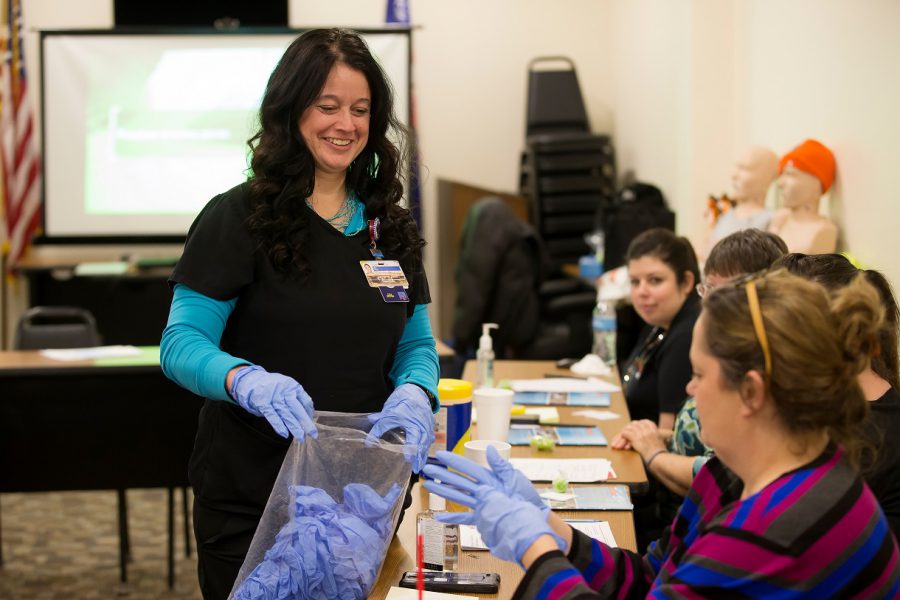
Citizen Potawatomi Nation leaders look for areas of improvement while ensuring the well-being of Tribal members, employees and their families. Because of this, CPN developed a Safety Department under the direction of Judy Rodriguez. She joined CPN more than 17 years ago, serving in a variety of roles across several enterprises including the FireLake Bowling Center and Grand Casino Hotel & Resort. Her first undertaking as director is to organize and conduct CPR and first-aid courses for all CPN employees.
Rodriguez developed a department with talented, knowledgeable staff to help with these efforts including Lisa Tiger, CPN CPR instructor and licensed practical nurse.
“With leadership supporting the CPR program, they proved once again the heart of the Nation is not just for those directly involved with Citizen Potawatomi Nation but every person, every life is important — that is why the training is being taught,” Tiger said.
The classes could save lives across the Nation and in Oklahoma. Heart disease kills more Native Americans than any other disease and is the leading cause of death of adults in Oklahoma.
“Training 2,300-plus people in CPR makes the Tribal community a safer place but also makes every ballgame we attend, every shopping area we shop or church that we attend a safer place,” Tiger said. “I have learned, for the most part, in an emergency situation, people want to help, but it’s usually because of their lack of confidence or lack of knowledge that they don’t.”
American Heart Association research shows 70 percent of Americans do not feel confident enough to act during a cardiac emergency due to lack of CPR training or a significant lapse in certification.
In the United States, 70 percent of cardiac arrests occur at home. Forty-six percent of those who have a heart attack or cardiac arrest event outside of a hospital get life-saving help prior to emergency personnel arriving. In fact, for every minute after a cardiac arrest without an automated external defibrillators (AED) or CPR, chances of survival drop 7-10 percent, she added.
Tiger began her nursing career in 2005, and her experience includes emergency room, hospice and clinical work.
“I am a survivor because of CPR,” Tiger said. “When I was a little girl, I fell in the family swimming pool. It was just for a few minutes. However, when my mom finally realized I was missing, I was floating on top of the water. She was quick to start CPR on me.
“It’s ironic because most people never knew this story until I began to teach these classes. Maybe that’s why these classes are so special to me. I know CPR makes a difference. I lived it.”
Fiscally responsible
First aid; AED; and infant, child and adult CPR training and certification can cost between $150 and $200 per person, Tiger said. Bringing the training in-house could save CPN more than $100 per person.
“It has been heartwarming to see various directors lend a hand to see this department get off the ground,” she said.
One department helped purchase the CPR manikins and accessories, another gave supplies, some provided additional support, the Information Technology Department helped with electrical components and several others offered facilities for class space.
“These are just a few examples of the support that has been shown by the other departments throughout the Nation,” Tiger said.
React Emergency Medical Services (React EMS) in Shawnee partners with CPN to help teach larger CPR classes and volunteers to answer any questions employees may have for paramedics or emergency help providers, she explained.
Another function of the new Safety Department is to stock and supply first-aid kits and provide maintenance on the approximately 1,000 fire extinguishers across the Nation.
“We are working through the clinic and ordering supplies in bulk,” Rodriguez said.
Her department will ensure the Tribe purchases only resources needed, helping cut wasteful spending.
Once all Tribal employees complete the four-hour CPR, AED and first-aid instruction course, CPN leadership plans to extend the opportunity to CPN employee family members, Rodriguez said.
“The leadership has proven itself to always put the people of CPN first, and this is just another example of that,” Tiger said. “I am honored to be part of it. The new Safety Department is looking forward to new and exciting things.”
